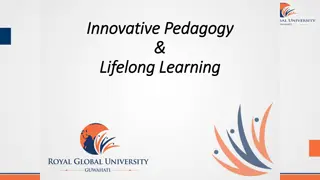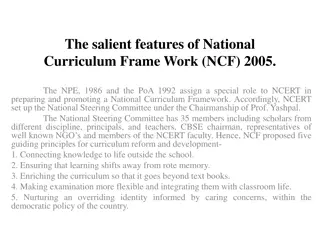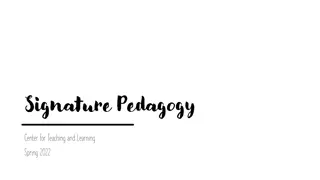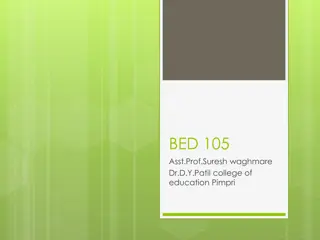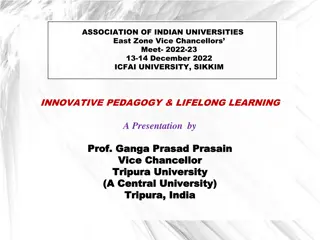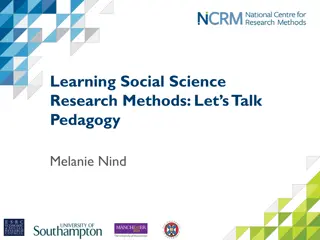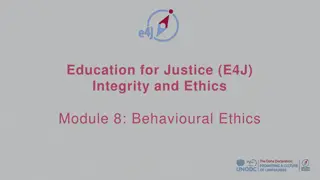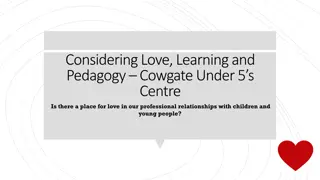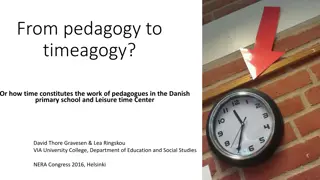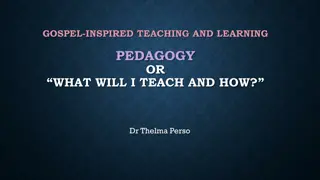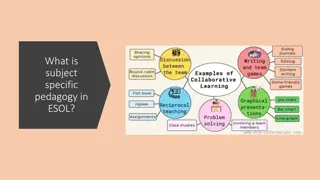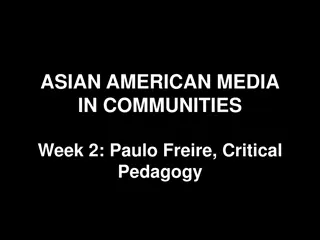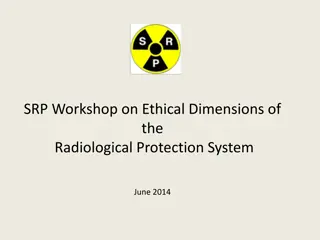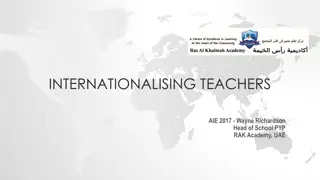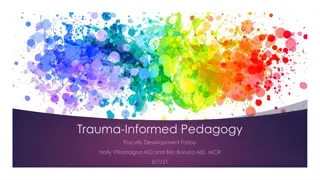Ethical Dimensions of Internationalising Curriculum and Pedagogy
Dr. Jenna Mittelmeier discusses the importance of developing ethical internationalisation in the curriculum and pedagogy. She explores the integration of international, intercultural, and global dimensions in postsecondary education, highlighting key ethical tensions and considerations for working with international students. The discussion also covers the challenges and opportunities in incorporating diverse curricular content to enhance the educational experience for all students.
Download Presentation

Please find below an Image/Link to download the presentation.
The content on the website is provided AS IS for your information and personal use only. It may not be sold, licensed, or shared on other websites without obtaining consent from the author. Download presentation by click this link. If you encounter any issues during the download, it is possible that the publisher has removed the file from their server.
E N D
Presentation Transcript
DEVELOPING ETHICAL INTERNATIONALISATION OF THE CURRICULUM AND PEDAGOGY Dr Jenna Mittelmeier Lecturer in International Education The University of Manchester 20 October 2020 @JLMittelmeier
@JLMittelmeier What is internationalisation? process of integrating an international, intercultural, or global dimension into the purposes, functions, or delivery of postsecondary education (Knight, 2004)
@JLMittelmeier Curriculum internationalisation the incorporation of an international and intercultural dimension into the content of the curriculum as well as the teaching and learning processes and support services of a program of study. (Leask, 2009)
@JLMittelmeier Why is this a topic of conversation? Projections of worldwide international student number growth (ICEF, 2018)
WHAT ARE (SOME OF) THE ETHICAL TENSIONS OF INTERNATIONALISATION?
Ethical considerations for our work with international students @JLMittelmeier Diversity often equated with nationality Homogenisation of THE international student experience Binary division between home and international students In more detail: Lomer, S. & Mittelmeier, J. (2020). Ethical challenges of hosting international Chinese students. In M. Natzler (ed). UK universities and China. Higher Education Policy Insititute. https://www.hepi.ac.uk/wp-content/uploads/2020/07/UK-Universities-and-China_HEPI-Report- 132_FINAL.pdf
@JLMittelmeier Ethical tensions for the curriculum Skills development outside of content knowledge tends to be centralised (language centres, study skills, etc.) Tendency to focus on additive measures rather than transformative Tendency for inclusions to be performative rather than meaningfully engaged with
@JLMittelmeier Types of curricular content Broadly international From students own backgrounds Home Gave home students an advantage, but was more easily relatable and interesting to international students Provided opportunities for intercultural discussion, but made some students feel uncomfortable Led students to feel disconnected, more instances of discriminatory language Mittelmeier (2017)
@JLMittelmeier Ethical tensions for pedagogy Tendency for discussions to focus on adaptation (i.e. assumptions that students should adapt to British-style learning) Tendency to focus on what students are assumed to lack : participation, critical thinking, experience, etc. Limited recognition or reflection on the cultural and historical educational values that shape students perceptions or contributions
@JLMittelmeier Pedagogies of Internationalisation SRHE project (Lomer & Mittelmeier, 2020) Limited academic research about internationalisation that focuses specifically on pedagogy Pedagogic research overwhelmingly to single-site case studies Tendency for research in this area to focus on deficit narratives Lack of systematic evidence about good practice for teaching in internationalised classrooms
WHAT CAN UNIVERSITIES DO TO TAKE A MORE ETHICAL APPROACH TO INTERNATIONALISATION? 10 SUGGESTIONS
@JLMittelmeier 1) Disrupt the deficit model Need for recognition and reflection on the underlying assumptions we have about international students skills and knowledges Need for action to transform deficit approaches, such as by calling out deficit narratives in our conversations https://www.tandfonline.com/doi/full/10.1080/0 3075079.2016.1152466
@JLMittelmeier 2)Dismantle the international / home student binary ? ? Not International international? Jones (2017): https://www.tandfonline.com/doi/full/10.1080/03075079.2017.1293880
@JLMittelmeier 3) Decentralise support Critical questions about: Why are support systems segregated into different departments? How can experts in different areas work together to develop a decentralised approach to support? Why are some supports separated for international and home students?
@JLMittelmeier 4) Recognise intersectionality Tendency for other facets of international students identities to be ignored: Race Gender Socioeconomic status Disability Religion Caring responsibilities (and more)
5) Address discrimination and racism Developing and supporting faculty roles around workload allocation for anti-racism initiatives that include international students Inclusion of international student representatives on equality and diversity committees; Staff training and reflection to identify and act on micro-aggressions witnessed in the classroom and on campus; Co-creating with students culturally sensitive mechanisms for disclosing instances of discrimination and racism, with explicit policies for acting on disclosures; Continued funding and resources for international societies and campus events that promote intercultural engagement; Resources and commitment to internationalising the curriculum and support for teaching approaches that meaningfully include international students and promote intercultural interaction; and Engagement with wider communities and local businesses around issues that affect students experiences off-campus. https://www.universityworldnews.c om/post.php?story=20201009142 439903
Thematic analysis of social media posts about international students post-COVID (Mittelmeier & Cockayne, under review) Pre-print: https://papers.ssrn.com/sol3 /papers.cfm?abstract_id=370 3604#references-widget @JLMittelmeier @h_cockayne
@JLMittelmeier 6) Support meaningful social interactions International students are often: Less likely to report having social relationships with home students (Gareis, 2012; Rienties et al., 2013; Heliot et al., 2019) More likely to encounter stereotypes compared to home students (Ruble & Zhang, 2013; Imamura et al., 2016) Often perceived by their peers as less assimilated (Imamura & Zhang, 2014)
Patterns of social division Example from a UK classroom: (Mittelmeier, 2017; follow up work Heliot, Mittelmeier, & Rienties, 2020) @JLMittelmeier
@JLMittelmeier 7) Decolonise and internationalise the curriculum Useful reflection tool for internationalisation: https://srhe.tandfonline.com/doi/abs/10.1080/14703297.2017.1386118 Decolonisation toolkit from SAOS: https://blogs.soas.ac.uk/decolonisingsoas/files/2018/10/Decolonising-SOAS-Learning-and- Teaching-Toolkit-AB.pdf Adding a few readings from non-Western scholars to reading lists or adding a section of the course on race is a shallow interpretation of the decolonial agenda. (Laing, 2020, p. 6)
@JLMittelmeier 8) Transform our teaching practices Considering opportunities for: Developing students critical consciousness (Freire, 1970) Questioning the underlying cultural assumptions of our pedagogies Developing opportunities for students to drive the direction of the conversation
@JLMittelmeier 9) Develop evidence for pedagogies from Lomer & Mittelmeier (under review)
@JLMittelmeier 10) Engage with local communities Growing polarisation of views towards international students: Growing polarisation of views towards international students: UK: UK: Majority of the public believe (58%) the UK should continue competing for international students, while a sizable minority (19%) wish to see numbers decrease (UUK, 2018).
@JLMittelmeier Some takeaway messages Internationalisation is about more than just the presence of international students Internationalisation brings questions of ethics and inclusivity Internationalisation is, at its very core, a transformative rather than additive approach
@JLMittelmeier Readings for critical internationalisation: Some good starting points Buckner, E., & Stein, S. (2020). What Counts as internationalization? Deconstructing the internationalization imperative. Journal of Studies in International Education, 24(2), 151 166. https://doi.org/10.1177/1028315319829878 Gayton, A. M. (2019). Exploring the widening participation-internationalisation nexus: evidence from current theory and practice Exploring the widening participation-internationalisation nexus: evidence from current theory and practice. Journal of Further and Higher Education https://doi.org/10.1080/0309877X.2019.1678014 Heng, T. T. (2018). Different is not deficient: Contradicting stereotypes of Chinese international students in US higher education. Studies in Higher Education, 43(1), 22-36. https://doi.org/10.1080/03075079.2016.1152466. Jones, E. (2017). Problematising and reimagining the notion of international student experience . Studies in Higher Education, 42(5), 933-943. https://doi.org/10.1080/03075079.2017.1293880 Madge, C., Raghuram, P., & Noxolo, P. (2014). Conceptualizing international education: From international student to international study. Progress in Human Geography, 39(6), 681-701. https://doi.org/10.1177/0309132514526442 Madriaga, M., & McCaig, C. (2019). How international students of colour become Black: a story of whiteness in English higher education. Teaching in Higher Education. https://doi.org/10.1080/13562517.2019.1696300 Rizvi, F. (2019). Global interconnectivity and its ethical challenges in education. Asia Pacific Education Review, 20(2), 315 326. https://doi.org/10.1007/s12564-019-09596-y Stein, S. (2019). Critical internationalization studies at an impasse: making space for complexity, uncertainty, and complicity in a time of global challenges. Studies in Higher Education. https://doi.org/10.1080/03075079.2019.1704722
Contact Information: Jenna Mittelmeier Lecturer in International Education University of Manchester jenna.mittelmeier@manchester.ac.uk Twitter: @JLMittelmeier
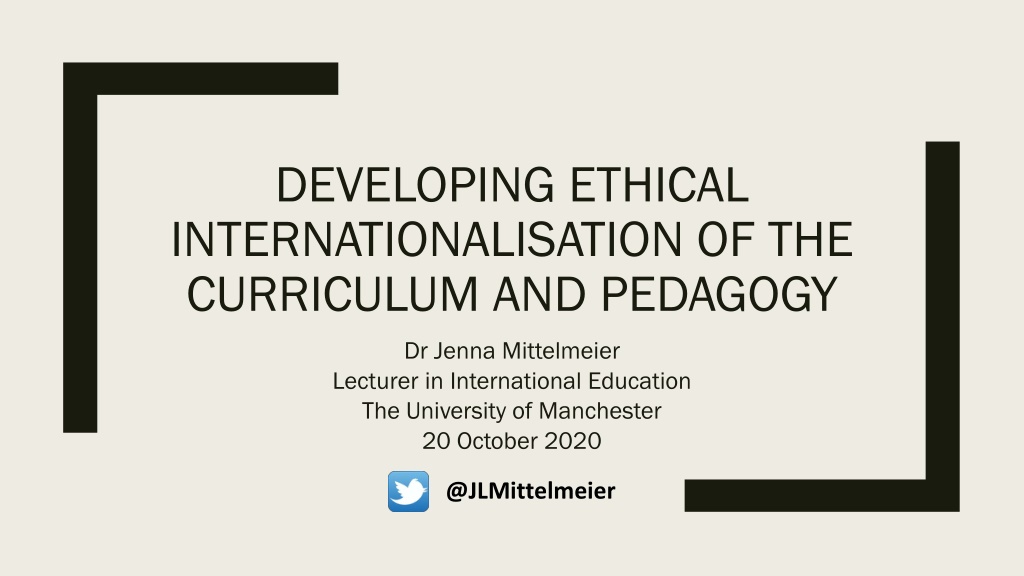
 undefined
undefined







